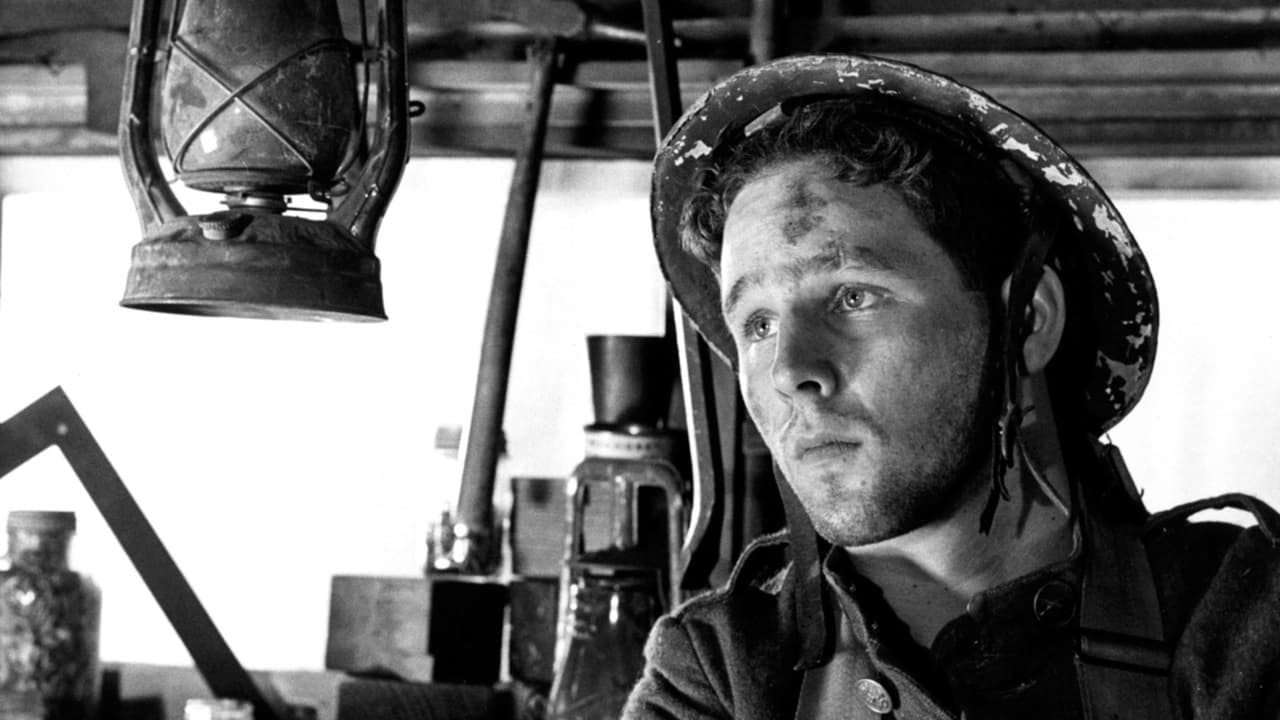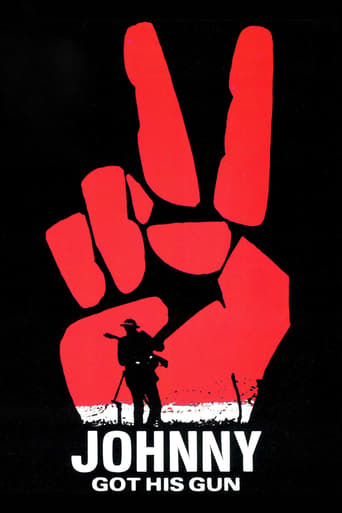

Very very predictable, including the post credit scene !!!
... View MoreThat was an excellent one.
... View MoreSERIOUSLY. This is what the crap Hollywood still puts out?
... View MoreAmazing worth wacthing. So good. Biased but well made with many good points.
... View MoreIt's a difficult movie to get a conventional handle on. Essentially, we're made to feel what Joe feels (note the universal "GI Joe" sort of name), as he lies trapped in his own bare consciousness inside a WWI field hospital. It's not death exactly, but cut off from the outside world by drastic combat wounds, he can experience only his own inner thoughts. So it's about as close to death as a bare level of consciousness can reach. Slowly he struggles to interpret the bare vibrations from outside that he senses. Trouble is he often has little control over his thoughts, as dreams, wishes, and recollections, all erupt beyond his control. Thus the movie narrative itself is non-linear for the most part, rendering his inner experience into a difficult series of fragments.Fortunately, the movie also follows the objective world of the hospital, where doctors and nurses tend to him. Contrasting this linear outer world with his fragmented inner world is one of the movie's strengths, since we are made to feel the terrible rupture that has occurred as a consequence of war.By filming his inner world in color, while contrasting that with the outer world of b&w, things are made somewhat easier to parse for viewers. Clearly, the movie's overall intent is to debunk the romanticism that's often made of blind patriotism and war service. Joe's pre-war life is normal and promising. However, he buys into the patriotic appeals of WWI (a dubious war, at best), resulting in what amounts to a future of living death. Wisely, the screenplay uses his tragic state as its anti-war message rather than preachy dialog, though documentary footage of such war-promoters a T. Roosevelt and Woodrow Wilson do appear.Acting isn't so important in the movie's scheme. It's Bottoms's boyish appearance that conveys his role. Then too, most of his screen time is spent under a therapeutic face mask in bed. It's really Jason Robards as Joe's dad who gets a chance to show his acting chops which he does. Good to see that fine veteran of film noir Charles McGraw as the churlish Mike. Meanwhile, the girls, Varsi and Fields, have little more to do than be appealingly nurturing. It's pretty clear that man-woman relationships are presented as worthy opposites to war-making. In that sense, this 1971 production echoes norms of the rebellious 60's.I haven't read Trumbo's book, so I don't know how well they compare. But given his roles as the movie's writer and director, the result can't be considered a travesty, a not infrequent claim by authors divorced from the movie versions. All in all, I can see why many folks would be put off with the narrative, difficult and disturbing as it is, especially by the quietly shattering conclusion. But for others, the movie's a bold attempt to deal with a highly unusual aspect of war, and in a very memorable way.
... View MoreFew films have left me so moved and shocked. I saw this film in passing, perhaps twice when I was in my teens. Half-hearted attempts to give it a name failed until I clicked through an IMDb list. It is gripping, moving and wonderfully told. You can never again lie awake in bed at night and not imagine how you would cope with such a nightmare. It poses so many questions about what it means to be alive, violent conflict, war, nursing and treatment and the right to live or die - even the 21st century question of what defines 'to be alive' and ways today to communicate through brain wave activity when there is nothing else to monitor. This should be seen by anyone with an interest in the First World War alongside documentaries, action thrillers, romances and comedy about conflict on this scale. As pertinent to those interested in the Second World War, indeed any conflict where a combatant is left horrendously broken and then kept in the quasi-statis of the undead.
... View MoreLet me preface this by saying I have not read the book but I definitely want to after seeing this very thought provoking film.Like many of you, I first heard about this movie from Metallica's video of their song, One. It's essentially the story of a young WWI soldier, Joe, who loses his limbs, his face, and all of his senses except for touch. But his mind is completely intact, yet trapped in his completely broken body. When I first heard about the movie, it seemed incredibly disturbing, and it definitely peaked my interest in seeing the film. But I never got around to actually seeing it until recently. And now that I've seen it, I'm very glad I have.The movie wasn't as disturbing as I thought it would be. Perhaps, had I seen this when I was younger, and more fearful of the losses he had suffered, I would have been horrified. But, as we age and are increasingly exposed to such tragedies and losses, our sensibilities numb somewhat, and we become more accepting of our own mortality and frailty. This movie is also somewhat comforting in that it makes ones own problems seem trivial by comparison. We often forget that things could always be worse. And Joe's situation seems to be about as bad as it good get. Nevertheless, he does his best to deal with it as best he can, which is also strangely comforting.Another reason why this movie didn't feel as depressing or disturbing as I thought was because the acting wasn't that great. There were times when I literally laughed out loud during some of the more emotional scenes simply because the delivery was off. The movie felt quite amateurish at times. There were also times when the film got a little too preachy. It often tries to force its pacifist views on the viewer a little too obviously, particularly in the way it portrays the military commanders as heartless buffoons with no redeeming qualities. Still, the movie did seem to get better as it went on and there were enough great moments in this movie to make it worthwhile.Probably my favorite aspect of the film was in the way it explored the themes of reality vs. dreaming. Because Joe is unable to communicate for much of the film, he creates a world for himself, mostly of memories, and of dreams, and of strange moments that have stuck with him. In his head, he often converses with his old girlfriend, a somewhat incompetent Jesus, and his father in order to get advice on how to deal with his situation. None are able to really provide good advice, reinforcing the fact that his situation is truly hopeless, but the things they talk about are often very thought provoking and deep on an almost existentialist level.Jesus, in particular, helps him to see that he is perhaps better off living for his dreams rather than for his real life, since his real life is more like a nightmare, and his dreams often give him hope and comfort. In a memorable conversation with his girlfriend, he questions what is real, and what time is. Since all he has is his memories and is no longer able to experience anything worthy of memory, does he really age? Will he ever forget anything since there are very few new memories to replace the old? In a way, he's frozen in time, and keeping track of time becomes one of his goals early on.All in all, this leads me to believe that the source material from which this film was made is probably much better than the film, and probably much deeper than just a simple pacifist's message. Check this film out if you get the opportunity, it will certainly make you think, and it's actually not as morbidly depressing and disturbing as you might think.
... View MoreJohnny Got His Gun (1971)I was devastated by the book, in the early 1970s, and yet this movie feels forced and a little cheesy. But this is purely because of how it was made, not for the story, which is terrifying both for the idea at its core, and for the way they carry it through. There might be some problems with the logic of what to show and from whose point of view. "The Diving Bell and the Butterfly" is easily a way to approach this problem a little differently. Dalton Trumbo, the director and the writer here, relies heavily on flashbacks, and in a way we have a movie of a young man preparing to go to war, with his girlfriend more afraid than he is about, and a father with troubles of his own, a whole panoply of memories that make up a young man's life.. The narration by Timothy Bottoms (from the wounded soldier's head) has an awkward delivery--the words work, the voice less so.The book when I read it felt like a protest to the Vietnam war, even though it was published in 1939. The movie was meant, I'm sure, to target more specifically Vietnam, but now, in 2010, it's lost some of that immediacy, and it becomes a bit more abstract. It's also a bit of a moviemaker's exercise, due to the restriction of point of view (either literally, or through flashbacks).No amount of analyzing will remove the horrors of this situation. The movie lingers when you think it should move on, and it stutters at times with some less than convincing acting. But when the communication actually begins, it's quite a thrill. Trumbo is a writer and screenwriter, and maybe this wears at the overall effect of the film, as a film. As a story, it remains devastating.
... View More